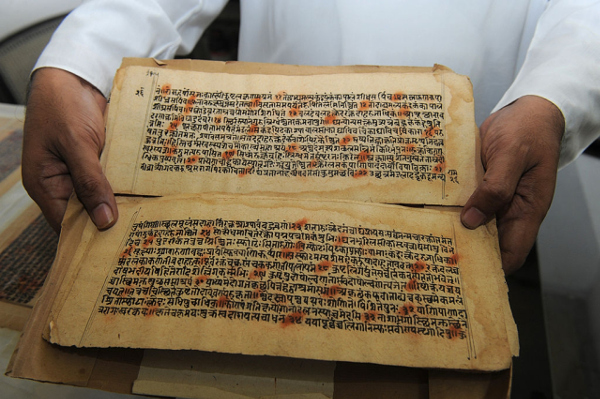The word ‘Veda’ means ‘knowledge’ and is derived from the Sanskrit root ‘vid’, means ‘to know’. It does not refer to one single literary work, but indicates a huge corpus of literature, which arose in the course of many centuries and has been handed down from one generation to another generation by verbal transmission. ‘Veda’ is also called ‘Shruti’ meaning what is heard, as opposed to the ‘Smriti’ composed by sages at a later stage recounting the content of the Vedic texts. This referes the purely oral-aural method which was (and is) used for it.
According to Indian traditional thoughts ‘Veda’ is regarded as revealed scripture, self-evident, and self authoritative. It is not composed by any human authors. The Vedic hymns (Suktas) or verses (Mantras) are seen and only spoken by the seers (Rishis). These seers are neither author of the Mantras nor are they responsible for the contents of the Mantras. Yaska, the oldest expositor of Veda, has distinctly said that these seers received the sacred knowledge or knowledge was revealed to them. They then handed it down to descendants by oral instruction. The great Vedic commentator Sayana has given a definition of the Veda-
‘Ishtaprapti-anishtapariharyor-alaukikam-upayam yo grantho vedayati sa vedah’
It means, “The scripture, which describes the divine method for obtaining what is desirable and for giving up what is undesirable, is called Veda.” This definition presents the purpose of the Veda. According to another definition, as per the sage Apastamba ‘the Veda is the name given to the Mantras and the Brahmanas’.
‘Mantra-brahmanyor-vedanamadheyam.’
This definition describes the form of the ‘Veda’ because it could be divided mainly into these two great divisions–the Mantras and the Brahmanas. Accordingly, Mantra part is the main part of the Veda and whatever is not Mantra is Brahmana. Here it is interesting to know that many ancient definitions of Veda, showing its significance, form or contents are given in ancient Indian texts. Generally speaking the word ‘Veda’ signifies highest, sacred, eternal and divine knowledge as well as the texts embodying that knowledge.
Source: Vedic Heritage
Image Courtesy: Gettyimages
You may also like
-
Navigating India’s Skill Landscape
-
IIFT Tops Worldwide in LinkedIn Global MBA Ranking 2024 in Networking, Holds 51st Position Among Top 100 Programmes
-
WorldSkills 2024: 60-Member Contingent of Team India Reaches Lyon, France
-
Extension of Last date to Submit Applications (Fresh & Renewal) Under National Means cum Merit Scholarship Scheme
-
National Exit Test (NExT) for Ayush to be Effective from 2021-2022 Batch: Union Minister of Ayush Shri Prataprao Jadhav
